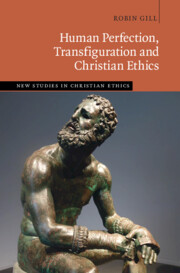Book contents
- Human Perfection, Transfiguration and Christian Ethics
- Reviews
- New Studies in Christian Ethics
- Human Perfection, Transfiguration and Christian Ethics
- Copyright page
- Contents
- Acknowledgements
- Introduction
- Part I Human Perfection
- Part II Jesus’ Perfection
- Part III Transfiguration and Global Perfection
- Chapter 7 Perfection and the Transfiguration
- Chapter 8 Perfection
- Chapter 9 A Perfect Planet
- Epilogue
- Select Bibliography in Christian Ethics
- Index
- Titles Published in the Series (continued from page )
- References
Chapter 9 - A Perfect Planet
from Part III - Transfiguration and Global Perfection
Published online by Cambridge University Press: 09 May 2024
- Human Perfection, Transfiguration and Christian Ethics
- Reviews
- New Studies in Christian Ethics
- Human Perfection, Transfiguration and Christian Ethics
- Copyright page
- Contents
- Acknowledgements
- Introduction
- Part I Human Perfection
- Part II Jesus’ Perfection
- Part III Transfiguration and Global Perfection
- Chapter 7 Perfection and the Transfiguration
- Chapter 8 Perfection
- Chapter 9 A Perfect Planet
- Epilogue
- Select Bibliography in Christian Ethics
- Index
- Titles Published in the Series (continued from page )
- References
Summary
Chapter 9 concludes this discussion of human perfection by looking at what many see as the most pressing global issue today – human environmental pollution and destruction. Viewed through the lens of the luminous television series A Perfect Planet, this chapter addresses the issues of unwarranted suffering from natural forces, religious and secular experiences of awe at biodiversity, and secular eschatological fears of ecological catastrophe. Damage to a perfect planet is viewed as a serious challenge to claims about human perfection. The Dominican theologians Herbert McCabe and Brian Davies (the latter debating with the philosopher Michael Ruse) are both used critically. Hope, however, is seen in the leadership offered by Pope Francis’ encyclical Laudato si and in a growing consensus among both faith and secular traditions that this damage must be addressed by effective action, based upon the moral concept of the common good, for the sake of both a perfect planet and the astonishing biodiversity (including human beings) within it.
Keywords
- Type
- Chapter
- Information
- Human Perfection, Transfiguration and Christian Ethics , pp. 195 - 221Publisher: Cambridge University PressPrint publication year: 2024

